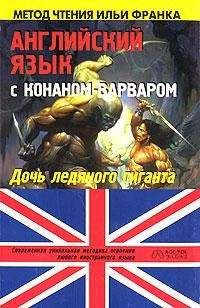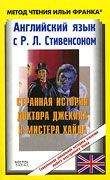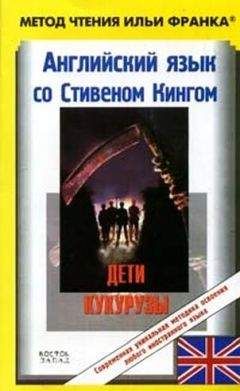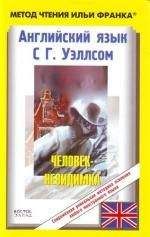wrench [renʧ], fast [fɑ:st], care [kɛə]
Conan bounded from the bushes, wrenched his ax free and dragged the limp body in among the trees, concealing it from the casual glance.
"Now let's go, and go fast!" he grunted, leading the way southward, away from the trail. "There'll be warriors coming after that cat. As soon as he got his wits back Zogar sent him after us. The Picts would follow him, but he'd leave them far behind. He'd circle the village until he hit our trail and then come after us like a streak. They couldn't keep up with him, but they'll have an idea as to our general direction. They'd follow, listening for his cry. Well, they won't hear that, but they'll find the blood on the trail, and look around and find the body in the brush. They'll pick up our spoor there, if they can. Walk with care."
He avoided clinging briars and low-hanging branches effortlessly (он избегал цепляющегося шиповника и низко свисающих ветвей без усилий; effort — усилие), gliding between trees without touching the stems (скользя между деревьями без касания = не касаясь стволов) and always planting his feet in the places calculated to show least evidence of his passing (и всегда ставя /свои/ ступни в места с расчетом показать = оставить как можно меньше свидетельств его прохода); but with Balthus it was slower, more laborious work (но с Балтусом = для Балтуса это был более медленный, более утомительный труд; least — меньше всего, минимум).
briar [ˈbraɪə], least [li: st], evidence [ˈevɪdəns]
He avoided clinging briars and low-hanging branches effortlessly, gliding between trees without touching the stems and always planting his feet in the places calculated to show least evidence of his passing; but with Balthus it was slower, more laborious work.
No sound came from behind them (ни одного звука /не/ доносилось сзади). They had covered more than a mile when Balthus said: "Does Zogar Sag catch leopard-cubs and train them for bloodhounds (они прошли более /чем/ мили, когда Балтус сказал: Зогар Саг ловит детенышей леопардов и обучает их для = как ищеек)?"
Conan shook his head (Конан покачал /своей/ головй). "That was a leopard he called out of the woods (это был леопард, /которого/ он вызвал из леса)." "But," Balthus persisted, "if he can order the beasts to do his bidding, why doesn't he rouse them all and have them after us (но, — Балтус настаивал, — если он может приказывать зверям выполнять его распоряжения, почему он не поднимет их всех и /не/ пошлет их за нами)? The forest is full of leopards; why send only one after us (лес полон леопардов, почему посылать лишь одного за нами)?"
does [dʌz], persist [pəˈsɪst], rouse [rauz]
No sound came from behind them. They had covered more than a mile when Balthus said: "Does Zogar Sag catch leopard-cubs and train them for bloodhounds?"
Conan shook his head. "That was a leopard he called out of the woods."
"But," Balthus persisted, "if he can order the beasts to do his bidding, why doesn't he rouse them all and have them after us? The forest is full of leopards; why send only one after us?"
Conan did not reply for a space (Конан не отвечал некоторое время), and when he did it was with a curious reticence (а когда он сделал = ответил, это было /сделано/ с необычной немногословностью; space — пространство, промежуток, срок, интервал).
"He can't command all the animals (он не может командовать всеми животными). Only such as remember Jhebbal Sag (только такими = теми, которые помнят Джеббала Сага)."
"Jhebbal Sag?" Balthus repeated the ancient name hesitantly (Джеббала Сага? — повторил Балтус древнее имя, заикаясь). He had never heard it spoken more than three or four times in his whole life (он никогда /не/ слышал, /чтобы/ его произносили более трех-четырех раз = он слышал его не более трех-четырех раз за всю свою жизнь).
reticence [ˈretɪsəns], command [kəˈmɑ:nd], animal [ˈænɪməl]
Conan did not reply for a space, and when he did it was with a curious reticence. "He can't command all the animals. Only such as remember Jhebbal Sag."
"Jhebbal Sag?" Balthus repeated the ancient name hesitantly. He had never heard it spoken more than three or four times in his whole life.
"Once all living things worshipped him (некогда все живые существа поклонялись ему). That was long ago, when beasts and men spoke one language (это было давно, когда звери и люди говорили /на/ одном языке). Men have forgotten him; even the beasts forget (люди забыли его, даже звери забывают). Only a few remember (лишь немногие помнят). The men who remember Jhebbal Sag and the beasts who remember are brothers and speak the same tongue (люди, которые помнят Джеббала Сага, и звери, которые помнят /его/, — братья и говорят на одном и том же языке; same — один и тот же, тот же самый)."
once [wʌns], worship [ˈwə: ʃɪp], language [ˈlæŋɡwɪʤ]
"Once all living things worshipped him. That was long ago, when beasts and men spoke one language. Men have forgotten him; even the beasts forget. Only a few remember. The men who remember Jhebbal Sag and the beasts who remember are brothers and speak the same tongue."
Balthus did not reply; he had strained at a Pictish stake (Балтус не ответил, он напрягался = пытался вырваться, вырывался у пиктского столба; to strain — натягивать; растягивать; напрягать) and seen the nighted jungle give up its fanged horrors at a shaman's call и видел, /как/ ночные джунгли отдавали своих клыкастых чудищ по зову шамана).
"Civilized men laugh," said Conan (цивилизованные люди смеются, — сказал Конан). "But not one can tell me how Zogar Sag can call pythons and tigers and leopards out of the wilderness and make them do his bidding (но никто /не/ может сказать мне, как Зогар Саг может призывать питонов и тигров и леопардов из диких мест и заставлять их исполнять его приказы). They would say it is a lie, if they dared (они бы сказали, /что/ это ложь, если бы осмелились). That's the way with civilized men (это /есть/ способ = вот так обстоит дело с цивилизованными людьми). When they can't explain something by their half-baked science, they refuse to believe it (когда они не могут объяснить что-то их недоношенной: «полу-испеченной» наукой, они отказываются верить этому)."
call [kɔ: l], science [ˈsaɪəns], refuse [rɪˈfju: z]
Balthus did not reply; he had strained at a Pictish stake and seen the nighted jungle give up its fanged horrors at a shaman's call.
"Civilized men laugh," said Conan. "But not one can tell me how Zogar Sag can call pythons and tigers and leopards out of the wilderness and make them do his bidding. They would say it is a lie, if they dared. That's the way with civilized men. When they can't explain something by their half-baked science, they refuse to believe it."
The people on the Tauran were closer to the primitive than most Aquilonians (люди в Тауране были ближе к первобытным /людям/, чем большинство аквилонцев); superstitions persisted, whose sources were lost in antiquity (сохранились суеверия, чьи источники = источники которых затерялись в древности). And Balthus had seen that which still prickled his flesh (а Балтус видел то, которое все еще будоражило его плоть). He could not refute the monstrous thing which Conan's words implied (он не мог опровергнуть чудовищную вещь = истину, которую заключали в себе слова Конана). "I've heard that there's an ancient grove sacred to Jhebbal Sag somewhere in this forest," said Conan (я слышал, что есть древняя роща, священная для Джеббала Сага, где-то в этом лесу, — сказал Конан). "I don't know (/я/ не знаю). I've never seen it (я никогда /не/ видел ее). But more beasts remember in this country than any I've ever seen (но больше тварей помнят в этих краях, чем я видел где-либо = но в этих краях помнят /Джеббал Сага/ больше тварей, чем я видел где-либо)."
people [pi: pl], source [sɔ: s], antiquity [ænˈtɪkwɪtɪ]
The people on the Tauran were closer to the primitive than most Aquilonians; superstitions persisted, whose sources were lost in antiquity. And Balthus had seen that which still prickled his flesh. He could not refute the monstrous thing which Conan's words implied.
"I've heard that there's an ancient grove sacred to Jhebbal Sag somewhere in this forest," said Conan. "I don't know. I've never seen it. But more beasts remember in this country than any I've ever seen."
"Then others will be on our trail (значит /и/ другие будут = пойдут по нашему следу)?"
"They are now," was Conan's disquieting answer (они уже /идут/, — был тревожный = вселяющий тревогу ответ Конана). "Zogar would never leave our tracking to one beast alone (Зогар никогда бы /не/ оставил наше преследование лишь одному зверю)."
"What are we to do, then?" asked Balthus uneasily, grasping his ax as he stared at the gloomy arches above him (что же нам тогда делать? — спросил Балтус обеспокоенно, сжимая свой топор, когда он уставился на мрачные арки над ним). His flesh crawled with the momentary expectation of ripping talons and fangs leaping from the shadows (у него по телу побежали мурашки от моментального ожидания рвущих когтей и клыков, выпрыгивающих из теней = от моментального опасения, что из теней выпрыгнут рвущие когти и клыки; to crawl — ползти (о мурашках)).
disquiet [dɪsˈkwaɪət], alone [əˈləun], ask [ɑ:sk]
"Then others will be on our trail?"
"They are now," was Conan's disquieting answer. "Zogar would never leave our tracking to one beast alone."
"What are we to do, then?" asked Balthus uneasily, grasping his ax as he stared at the gloomy arches above him. His flesh crawled with the momentary expectation of ripping talons and fangs leaping from the shadows.
"Wait (подожди)!"
Conan turned, squatted and with his knife began scratching a curious symbol in the mold (Конан повернулся, сел на корточки и своим ножом начал выцарапывать необычный символ в рыхлой земле). Stooping to look at it over his shoulder, Balthus felt a crawling of the flesh along his spine, he knew not why (наклонившись, /чтобы/ посмотреть на него = знак через его плечо, Балтус почувствовал, как побежали мурашки вдоль позвоночника: «бегание мурашек плоти вдоль позвоночника», он не знал почему). He felt no wind against his face (он не ощущал ветра в лицо), but there was a rustling of leaves above them (но было шуршание листьев над ними) and a weird moaning swept ghostily through the branches (и причудливый стон пронесся призрачно через ветви; to sweep — мести; проноситься). Conan glanced up inscrutably, then rose and stood staring somberly down at the symbol he had drawn (Конан взглянул вверх непроницаемо, потом поднялся и стоял, угрюмо уставясь /вниз/ на символ, /который/ он нарисовал; to draw — рисовать).
symbol [ˈsɪmbəl], mold [məuld], inscrutably [ɪnˈskru: təblɪ]
"Wait!"
Conan turned, squatted and with his knife began scratching a curious symbol in the mold. Stooping to look at it over his shoulder, Balthus felt a crawling of the flesh along his spine, he knew not why. He felt no wind against his face, but there was a rustling of leaves above them and a weird moaning swept ghostily through the branches. Conan glanced up inscrutably, then rose and stood staring somberly down at the symbol he had drawn.
"What is it?" whispered Balthus (что это? — прошептал Балтус). It looked archaic and meaningless to him (он = знак казался архаичным и бессмысленным для него). He supposed that it was his ignorance of artistry which prevented his identifying it as one of the conventional designs of some prevailing culture (он предположил, что это было его незнание искусства, которое = что его невежество мешало ему отождествить его как = с одним из условных знаков какой-то господствующей культуры; to prevail — торжествовать (over), одержать победу; достигать цели; преобладать, господствовать, превалировать). But had he been the most erudite artist in the world, he would have been no nearer the solution (но если бы он был = но будь он /даже/ самым эрудированным художником в мире, он не подошел бы ближе к решению).





